Yext Bundle
Who Really Calls the Shots at Yext?
Understanding who owns a company is critical for investors and strategists alike, as it directly influences a company's strategic direction and future prospects. The story of Yext, a leader in digital knowledge management, is a compelling case study in how ownership evolves. From its inception to its current standing, the Yext SWOT Analysis can provide further insights into the company's position.
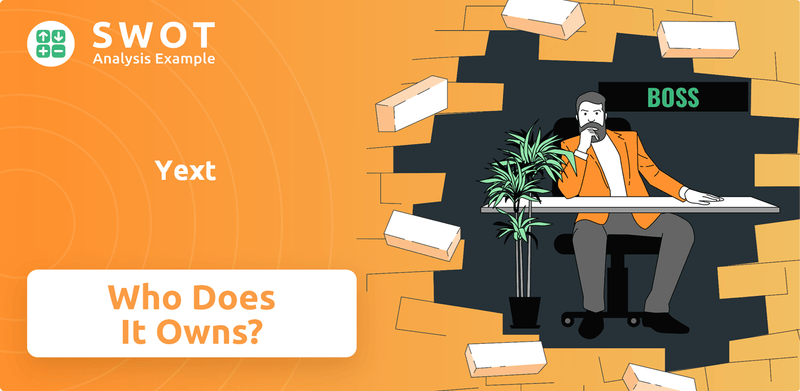
Yext's journey from a private startup to a publicly traded entity has significantly reshaped its ownership landscape. This exploration will uncover the evolution of Yext's ownership, from the initial founders to the current major shareholders and institutional investors. Knowing who owns Yext is crucial for grasping the company's strategic decisions, its financial performance, and its trajectory within the competitive digital marketing sector, including insights on Yext stock and the influence of the Yext CEO.
Who Founded Yext?
The digital knowledge management company, was co-founded by Howard Lerman, Brian Distelburger, and Brent Metz. Howard Lerman served as the company's CEO for many years, guiding its product vision and overall growth. Brian Distelburger played a key role in business development and strategic partnerships, while Brent Metz contributed to the foundational technology. Understanding the company's ownership structure provides insights into its strategic direction and financial health.
Early ownership of the company involved the founders and initial investors. While specific equity splits for the founders are not publicly detailed, it is common for co-founders to have a significant shareholding at the beginning, subject to vesting schedules. This structure is designed to align the founders' interests with the long-term success of the company.
Early backing often involves seed funding rounds where friends, family, and individual angel investors contribute capital in exchange for equity. As the company progressed, it secured funding from prominent venture capital firms, which provided crucial capital for growth and expansion. These early agreements, including vesting schedules for founders, are designed to ensure long-term commitment and mitigate risks.
Howard Lerman, Brian Distelburger, and Brent Metz co-founded the company.
Early funding rounds involved angel investors and venture capital firms.
Founders likely held significant equity, subject to vesting.
Venture capital provided capital for growth and expansion.
Any early ownership disputes or buyouts are not widely publicized, suggesting a relatively stable founding team and investor base in its initial stages.
The founding team's vision for a centralized digital knowledge platform was reflected in the early distribution of control, emphasizing growth and technological development.
Understanding the early ownership structure of the company, including the roles of the founders and early investors, provides a foundation for analyzing its evolution. The early decisions regarding equity distribution and funding rounds shaped the company's trajectory. The company's early focus on product vision and growth is also reflected in the early distribution of control. For more insights, you can explore the Target Market of Yext.
- Founders: Howard Lerman, Brian Distelburger, and Brent Metz.
- Early Investors: Angel investors and venture capital firms.
- Ownership Structure: Significant founder equity, subject to vesting schedules.
- Strategic Focus: Emphasis on growth and technological development.
Yext SWOT Analysis
- Complete SWOT Breakdown
- Fully Customizable
- Editable in Excel & Word
- Professional Formatting
- Investor-Ready Format
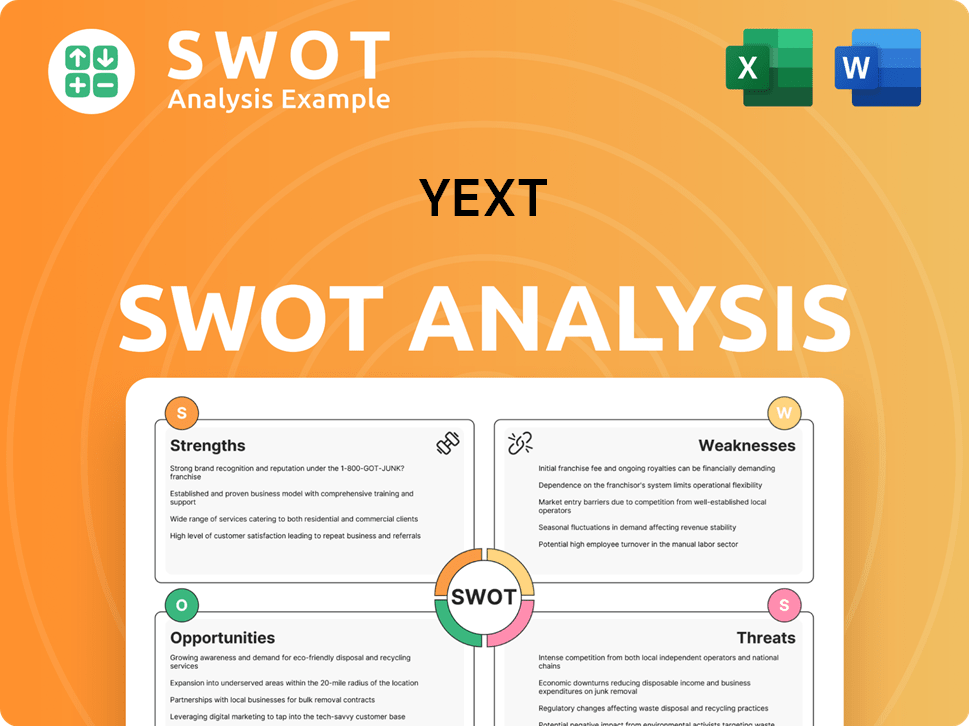
How Has Yext’s Ownership Changed Over Time?
The ownership structure of the company, now known as Yext, underwent a significant transformation with its Initial Public Offering (IPO) on April 7, 2017. The company began trading on the New York Stock Exchange under the ticker symbol 'YEXT.' This transition moved the company from private ownership, primarily by founders and venture capitalists, to a publicly traded entity with a diverse shareholder base. The IPO raised approximately $115 million.
Following the IPO, the major shareholding of Yext has shifted towards institutional investors. These include mutual funds, index funds, and hedge funds, which collectively hold a substantial portion of the outstanding shares. For example, Vanguard Group Inc. and BlackRock Inc. are often among the top institutional holders, reflecting their broad market index strategies. Individual insiders, including current and former executives and board members, also retain stakes, although their percentage ownership typically decreases post-IPO due to dilution and stock sales. Understanding the Marketing Strategy of Yext can provide further insights into the company's evolution.
| Event | Date | Impact on Ownership |
|---|---|---|
| Initial Public Offering (IPO) | April 7, 2017 | Transitioned from private to public ownership; raised approximately $115 million. |
| Institutional Investment Growth | Late 2017 - Early 2025 | Increased holdings by institutional investors like Vanguard and BlackRock. |
| Insider Ownership Changes | Ongoing | Dilution and stock sales lead to a decrease in individual insider ownership percentages. |
Changes in major shareholding can influence company strategy and governance. Large institutional investors often engage with management on corporate governance, environmental, social, and governance (ESG) factors, and executive compensation. While specific figures for the most recent periods would require detailed analysis of SEC filings such as 13F reports, the trend generally indicates a diversified institutional ownership base common for publicly traded technology companies. The current CEO of Yext and the Yext leadership team play a crucial role in navigating these changes.
Yext's ownership structure has evolved significantly since its IPO in 2017, shifting from private to public ownership.
- Institutional investors, such as Vanguard and BlackRock, are major shareholders.
- Insider ownership percentages have decreased due to dilution and stock sales.
- Changes in ownership can influence company strategy and governance.
- Understanding who owns Yext provides insights into its strategic direction.
Yext PESTLE Analysis
- Covers All 6 PESTLE Categories
- No Research Needed – Save Hours of Work
- Built by Experts, Trusted by Consultants
- Instant Download, Ready to Use
- 100% Editable, Fully Customizable
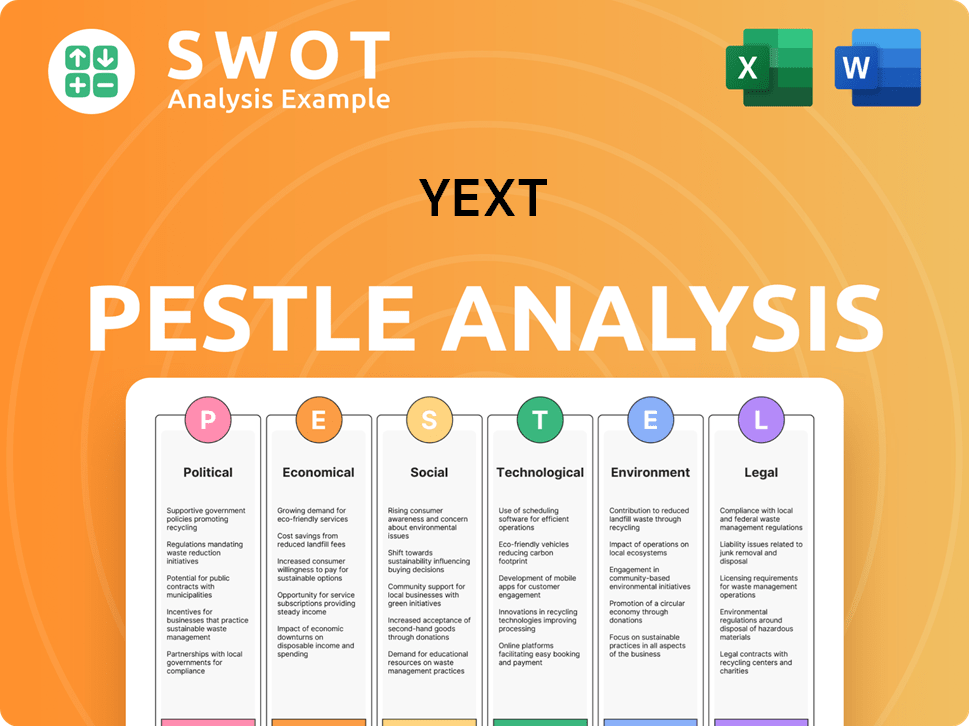
Who Sits on Yext’s Board?
The Board of Directors at the Yext company is responsible for overseeing the company's operations and representing the interests of its shareholders. As of early 2025, the board typically includes a mix of independent directors, executive directors (like the CEO), and potentially representatives of significant shareholders. The presence of independent directors is particularly important for ensuring objective oversight and accountability within the company. The current board composition reflects a commitment to a blend of industry experience, financial expertise, and independent judgment, which is crucial for guiding the company's strategic direction.
The board's decisions significantly influence the company's long-term strategy, capital allocation, and risk management, all of which directly impact shareholder value. For those interested in the Growth Strategy of Yext, understanding the role and composition of the board is essential, as it shapes the company's future. The board ensures that Yext operates in a manner that aligns with the interests of its investors and stakeholders.
| Director | Title | |
|---|---|---|
| Michael Walrath | Chairman of the Board | |
| Howard Lerman | Director | |
| John G. Raeder, Jr. | Director |
Yext operates under a one-share-one-vote structure, meaning each share of common stock generally entitles the holder to one vote on matters such as electing directors. There are no special voting rights that would grant outsized control to specific individuals or entities. This structure ensures that all shareholders have a proportional say in the company's governance. The Yext ownership structure is designed to provide a fair and transparent process for decision-making.
The Board of Directors at Yext plays a crucial role in corporate governance and oversight, representing the interests of shareholders. Yext operates under a one-share-one-vote structure, ensuring equitable voting rights for all shareholders. The board's decisions shape the company's long-term strategy, capital allocation, and risk management.
- The board includes independent directors and executive directors.
- Each share of common stock typically has one vote.
- The board guides the company's strategic direction.
- The board's decisions impact shareholder value.
Yext Business Model Canvas
- Complete 9-Block Business Model Canvas
- Effortlessly Communicate Your Business Strategy
- Investor-Ready BMC Format
- 100% Editable and Customizable
- Clear and Structured Layout
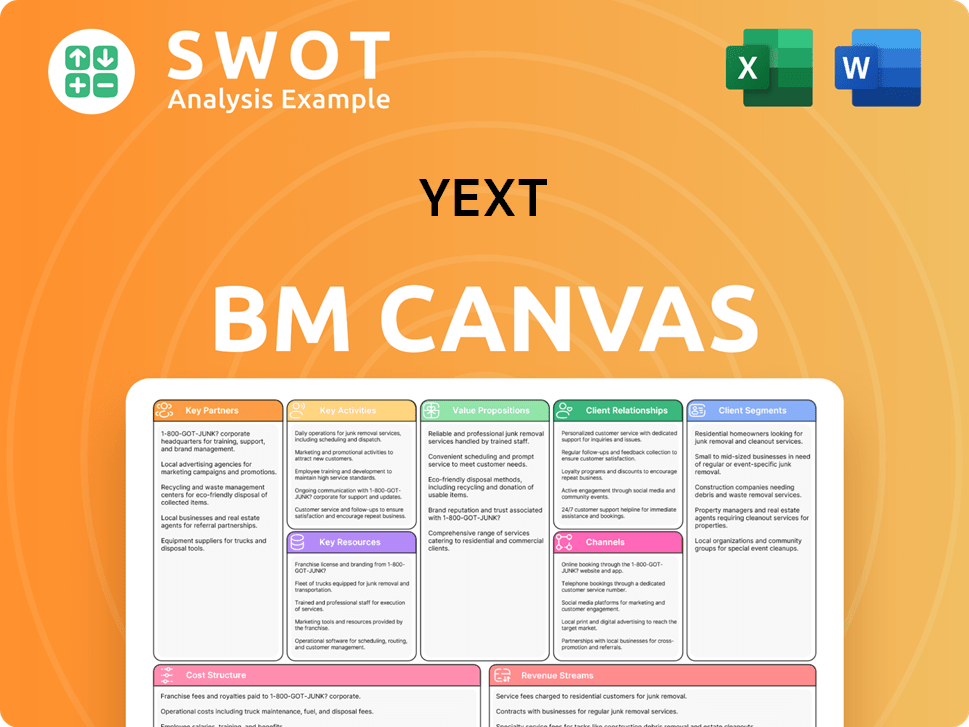
What Recent Changes Have Shaped Yext’s Ownership Landscape?
Over the past few years (roughly 2020-2025), Yext has seen developments that have influenced its ownership. While significant share buybacks or secondary offerings haven't been major events, the company continues to compete in digital knowledge management. Leadership changes can affect ownership; for example, Howard Lerman moved from CEO to Chairman of the Board in March 2022, with Michael Walrath becoming CEO. Such shifts can change insider ownership. Understanding Yext ownership involves looking at these kinds of transitions.
Industry trends also matter when considering Who owns Yext. There's a general increase in institutional ownership in public companies, as large funds invest broadly. Founder dilution naturally occurs through funding rounds and IPOs, reducing the original founders' ownership percentage. While consolidation through mergers and acquisitions can reshape ownership, Yext has mainly focused on organic growth and smaller acquisitions. The rise of activist investors hasn't significantly impacted Yext. The shifts in Yext stock ownership are worth monitoring for anyone interested in the Yext company.
| Metric | Value | Source/Date |
|---|---|---|
| Market Capitalization | Approximately $300 million | (As of May 2024) |
| Institutional Ownership | Around 70% | (Recent filings, May 2024) |
| Insider Ownership | Approximately 5% | (Recent filings, May 2024) |
Public statements about future ownership changes, succession plans, or potential privatization are not widely reported, indicating a focus on executing its current business strategy as a public entity. The company is concentrating on product innovation, market expansion, and profitability to boost shareholder value, which is key for Yext investors. The current Yext CEO is Michael Walrath.
Howard Lerman transitioned from CEO to Chairman of the Board in March 2022. Michael Walrath, a board member, became the new CEO. These changes can influence insider ownership and strategic direction. The leadership team's decisions directly impact the company's performance and shareholder value.
Institutional ownership in public companies is generally increasing. Large funds invest broadly, impacting the ownership structure. This trend highlights the importance of understanding institutional investor behavior. Monitoring institutional holdings provides insights into market sentiment and stability.
Founder dilution is a natural outcome of funding rounds and IPOs. New equity is issued to raise capital, reducing the founders' percentage ownership. This is a common process in growing companies. It's essential to understand how dilution affects the original stakeholders.
Yext is focused on product innovation, market expansion, and profitability. The company aims to enhance shareholder value. This strategic direction is crucial for long-term success. These efforts are key for Yext's future.
Yext Porter's Five Forces Analysis
- Covers All 5 Competitive Forces in Detail
- Structured for Consultants, Students, and Founders
- 100% Editable in Microsoft Word & Excel
- Instant Digital Download – Use Immediately
- Compatible with Mac & PC – Fully Unlocked
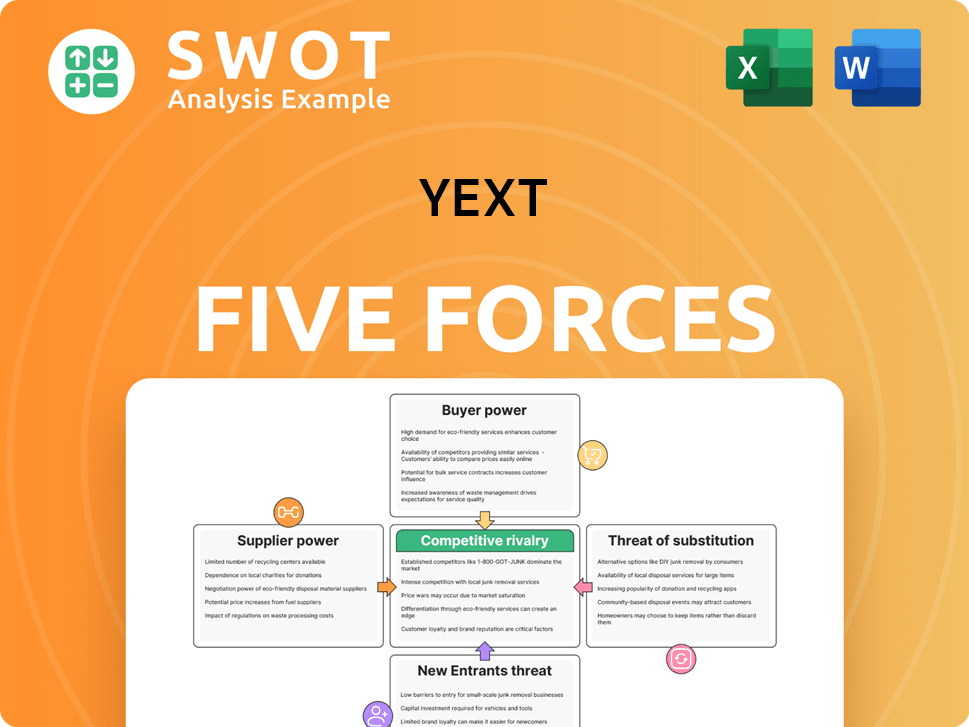
Related Blogs
- What are Mission Vision & Core Values of Yext Company?
- What is Competitive Landscape of Yext Company?
- What is Growth Strategy and Future Prospects of Yext Company?
- How Does Yext Company Work?
- What is Sales and Marketing Strategy of Yext Company?
- What is Brief History of Yext Company?
- What is Customer Demographics and Target Market of Yext Company?
Disclaimer
All information, articles, and product details provided on this website are for general informational and educational purposes only. We do not claim any ownership over, nor do we intend to infringe upon, any trademarks, copyrights, logos, brand names, or other intellectual property mentioned or depicted on this site. Such intellectual property remains the property of its respective owners, and any references here are made solely for identification or informational purposes, without implying any affiliation, endorsement, or partnership.
We make no representations or warranties, express or implied, regarding the accuracy, completeness, or suitability of any content or products presented. Nothing on this website should be construed as legal, tax, investment, financial, medical, or other professional advice. In addition, no part of this site—including articles or product references—constitutes a solicitation, recommendation, endorsement, advertisement, or offer to buy or sell any securities, franchises, or other financial instruments, particularly in jurisdictions where such activity would be unlawful.
All content is of a general nature and may not address the specific circumstances of any individual or entity. It is not a substitute for professional advice or services. Any actions you take based on the information provided here are strictly at your own risk. You accept full responsibility for any decisions or outcomes arising from your use of this website and agree to release us from any liability in connection with your use of, or reliance upon, the content or products found herein.